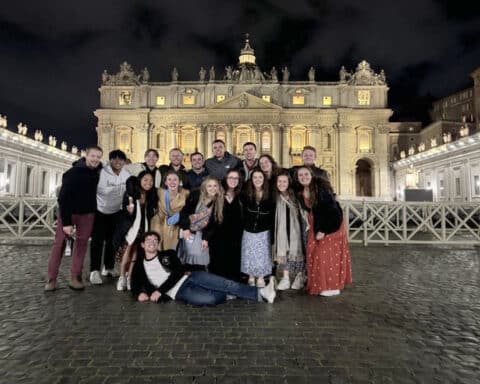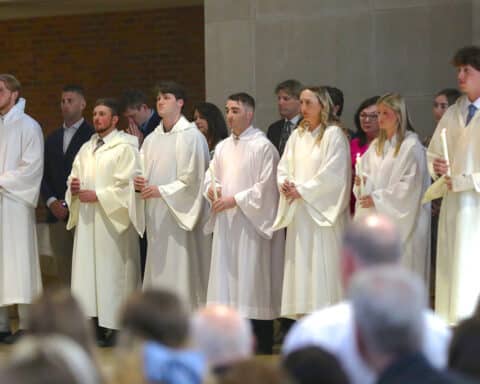Eight hundred years after the death of St. Dominic, his charism is very much alive. In fact, his influence endures and is bearing tremendous fruit at several Catholic colleges and universities that bear his name.
One of the key reasons for the enduring legacy of St. Dominic at these particular institutions is that members of his Order of Preachers (the Dominicans) assist in the formation of lay students, religious and clergy.
“We’re predominantly being taught by Dominicans” said Kate Arenchild, who notes that there is a distinctly Dominican integration of prayer and study in the way they teach. A part-time student at the Dominican School of Philosophy and Theology in Berkeley, California, Arenchild acknowledges that the “formation the Dominicans receive” they “passed on to us.”
Arenchild also perceives that “being with the student brothers,” who are in formation with the Dominicans, helps inculcate St. Dominic’s charism in students. “They’re this living part of the tradition,” she told Our Sunday Visitor in a phone interview. “So just interacting with them as friends, you start to pick some things up.”
Read more from our Catholic Colleges Fall 2021 special section here.
Theresa Ryland, a recent graduate of the Pontifical Faculty of the Immaculate Conception at the Dominican House of Studies in Washington, D.C., notes that a key component of this living tradition is being “orientated toward contemplative study and prayer.”
Your study informs your prayer, and your prayer informs your study, agrees Arenchild.
Both laywomen regard opportunities for communal prayer — through the Rosary, daily Mass and the Liturgy of the Hours — as playing a significant role in their student life.
“There’s something about chanting the psalms and going to Mass that teaches you by doing,” Arenchild said. “It’s something implicit that you start to pick up and start to live, and that was super life-giving for my own faith.”
Ryland has shared a similar experience that has helped foster her own personal devotion to St. Dominic.
“The Dominicans have an exhortation to pray the Rosary every day, and that’s something that has become a part of my life through his presence in my life and his real devotion to Mary,” Ryland said of St. Dominic. “He loved Mary, and so when I pray, it’s always with St. Dominic and Mary. I try to pray the Rosary through his intercession.”
A lasting legacy
Concerning St. Dominic’s intercession, Father Andrew Hofer, OP, an associate professor and the director of the doctoral program at the Dominican House of Studies, refers to Paragraph 956 of the Catechism of the Catholic Church, which pairs St. Dominic’s influence after death with that of St. Thérèse of Lisieux, who famously desired that she spend her “heaven in doing good on earth.”
Father Hofer notes that the Catechism quotes St. Dominic’s dying words: “Do not weep, for I shall be more useful to you after my death and I shall help you then more effectively than during my life.”

“It is true!” Father Hofer said in an email interview with Our Sunday Visitor. “Our holy father St. Dominic takes care of his family throughout the world century after century. We rely on his intercession that we may be faithful to the charism that God gave him and his Order of Preachers.”
Ryland can attest to the personal implications of St. Dominic’s heavenly companionship and intercession.
“St. Dominic has been hugely influential in my education,” she said concerning her time at DHS. “St. Dominic’s influence is directly why I’m here.”
Prior to her graduate studies at the Dominican House of Studies, which culminated in her earning a master’s degree in theology this past May, Ryland completed a classics degree at the University of Virginia. Though she greatly valued her education there, Ryland said it was missing the integration of faith and reason that the Dominicans offered.
Ryland, the executive assistant for advancement at the Dominican House of Studies, recounted how she “ended up” there through an apostolate of the school, the Thomistic Institute, which “exists to promote Thomistic thought at university campuses.” The Virginia native founded a chapter of the Institute on her undergraduate campus. She explained that this is relevant to a discussion of the person of St. Dominic because the apostolate does “exactly what St. Dominic did in his ministry.”
St. Dominic recognized a real need for basic training in the truths of the Catholic faith, Ryland said. “His entire ministry was reclaiming truth and speaking truth in very simple terms for the faithful.” She added that, from the very beginning, Dominicans were “closely associated with university life” and the work of preaching truth “to the university setting.”
Ryland notes that St. Dominic’s “charism of truth” is “not just an intellectual sort of endeavour.” Rather “it’s always for the sake of knowing greater so that you can love greater.” “That was very inspiring to me,” Ryland said.
All things in charity
Arenchild relates to this draw of the truth, particularly on account of the connection to love.
She described St. Dominic’s disposition to those who promulgated, and fell prey to, the heresies of his day. “He talks with people and he wants to see them go from confusion to clarity about the truth of the Gospel,” said Arenchild, who also works as the communications manager for the Western Dominican Province. “It’s always wrapped in love, which I really appreciated.”
Arenchild cited this characteristic approach of Dominican saints such as St. Dominic himself, Catherine of Siena and Thomas Aquinas. “They’re always engaging with those around them with this deep sense of charity,” she said.
The convert to Catholicism from evangelical Protestantism perceives a particular applicability of the Dominican charism for contemporary society. She noted that people no longer “know how to balance” love and truth. “I think you see the extremes on both sides,” said Arenchild, who is working toward her master’s degree in philosophy.
Even so, Arenchild, 24, believes “the Dominican tradition doesn’t sacrifice either one” of these fundamentals. Rather, St. Dominic’s life-witness “offers a middle path” between extremes. “St. Dominic is relevant to students right now because he teaches us how to speak the truth with both charity and clarity,” she said. “He engaged with those who disagreed with him with love but also with the truth.”
‘For the salvation of souls’
Brother Andrew Thomas Kang, OP, a student at the Dominican School of Philosophy and Theology in California, told Our Sunday Visitor about this link between study and love, saying how St. Dominic had a “profound urgency for the salvation of souls.” This resulted in his order emphasizing the education of preachers not merely to say things “that were rhetorically convincing” or to be inspiring on an emotive level, but “that were really grounded in a serious study of theology.”
Brother Andrew said that “the spirit of St. Dominic” prompts a “discipline to not try to just work with easy answers” and short, off-the-cuff prepared remarks “but to actually struggle with people’s questions.”
Brother Andrew, 29, notes that St. Dominic’s legacy continues in the Dominican formation, which delves deeply into subject matter in order to “see the heart of people we’re trying to convert.” “Your studying is for the salvation of souls,” he said. “It’s for the good of the people to whom we will preach.”
Ryland expounds upon this Dominican call to preach.
“Preaching for the salvation of souls is particularly done in the pulpit in the liturgical setting,” she said. “But it’s also done in the workplace by members of the Church who live differently because they are Christian.”
Concerning the laity embodying this aspect of the Dominican identity, Ryland adds that the lay faithful are “animated by the truth that they hear from their priest.” She noted that this is “a beautiful symbiotic relationship, where the truth preached” can “inform the laity of how to live, such that they themselves preach with their actions.”
Arenchild suggested that, for all these reasons, St. Dominic is a fitting patron of contemporary evangelistic efforts. “His charism and spirituality offer us so many tools to be able to engage with our culture with both clarity and charity.”
“I think it’s the age of St. Dominic,” she said. “He offers a model of spirituality that I think is really applicable for what we’re facing today as Catholics.”
Nicole Snook writes from Canada.
| EMBODYING THE DOMINICAN SPIRIT |
|---|
| Before Elizabeth Duffy began her studies at Providence College, she would have classified herself as an agnostic. Though Duffy had received the sacraments of initiation, she recounts how she “was not engaged with the faith by any means.”
However, when the 19-year-old was exposed to the “intellectual and contemplative approach” at the Dominican college in Providence, Rhode Island,her curiosity was piqued. “It felt brand new to me,” she told Our Sunday Visitor. “It clicked with me.” Duffy also became acquainted with the Dominican friars through various campus ministry programs. “They are an amazing example to all of us as students of St. Dominic, and representative of his charism in a lot of ways, specifically their commitment to the intellectual life and the contemplative life, but also their preaching,” she said. “They’ve just been extremely important in my own spiritual growth.” The rising junior cites the Development of Western Civilization Program — which is mandatory for freshman and sophomore students — as a major way the influence of St. Dominic endures. There’s a huge emphasis on thinking critically and taking time to consider and contemplate the bigger questions of human life, Duffy said of the program. “I think this particular generation that I’m in has a … feeling that learning is functional, it’s not enriching or fulfilling; it doesn’t teach you anything about yourself, it just teaches you things outside of yourself that you can use for other purposes,” Duffy said. “But I don’t think that’s true at all, and I don’t think St. Dominic would agree with that either.” Instead, the theology and humanities double major student maintains that St. Dominic would extol “the value of learning for its own sake.” Learning is a really important opportunity to focus on who God wants you to be and pursuing that as your end, she said. Asked about her hopes for the future, Duffy acknowledges that she might want to teach. “I’ve been very inspired by my theology professors here,” she said. “I just don’t want to stop learning.” Laughing, Duffy said that this is “very Dominican-like.” |





